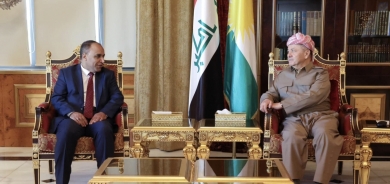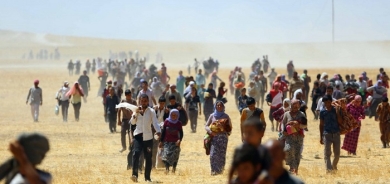Dr. Christina Isabel Zuber to Gulan Magazine: It seems to me like the concept of a "federacy" could be a potential solution; Iraq could remain a unitary state, except for an asymmetrical auto
November 16, 2011
Exclusive Interviews

Dr. Christina Isabel Zuber M.A. is a Research Assistant, Chair in Comparative Politics in the Department of Political Science at University of Cologne in Germany, and she is a specialist on comparison among the federal systems and the competitions of the political parties and South West Europe Policy. Regarding to the federal systems throughout the world and the factors of promoting this process, we have contacted the Professor Zuber, and she expressed her views and perspectives to Gulan Magazine in an exclusive interview as shown bellow:* Federalism is a method to have coexistence of religions and nations in a country. But the successful experiences are evidence that federalism cannot succeed in the absence of democracy, just like the former Soviet Union countries and the Middle and Eastern Europe. According to your opinion; why federalism cannot succeed in the absence of democracy?
- There are two aspects two this question. Both concern the examples you mention and constitute explanations for their failure:
The first is whether federalism is possible without democracy. The problem with combining non-democratic systems with federalism is that the very definition of federalism is that regional governments have constitutionally secured decision-making power that can not be unilaterally revoked by the centre. If one party controls the centre and the regions alike (i.e. in an autocratic regime), how can the regions have real autonomous decision-making power? Additionally, which non-democratic regime would subsume its powers to a strong constitution and a strong, independent constitutional court? Because you need a strong constitutional court in a federal state as a higher instance in the system that can resolve conflicts between the centre and the regions over competencies and resources that naturally occur when power is divided between several levels of government, and hence, several government officials with their own power agenda. So without constitutional democracy, there can no be real regional autonomy and there can be no higher order resolution of conflicts between levels of government, and hence no functioning federalism in the real sense of the word.
Whether federalism is possible as ethno-federalism is another very important question. The Soviet Union and Yugoslavia were not only non-democratic federal states, they were also ethno-federal states. This means that the boundaries of the constituent units were drawn along the boundaries of the settlement of ethno-national groups. The result of this was that in particular in Yugoslavia, every debate, and every political conflict between the units of the federation (something that occurs quite naturally in every federal system, as I stated above, because the constitution can only broadly define the division of competencies) could easily be framed by elites as an ethnic conflict (even though in substance it may not have been about ethnic identity, but about money and power). Additionally, ethno-federalism provides ethno-national or religious groups with a quasi state. On the positive side, this helps to regulate a conflict if opposing groups do not trust each other and would rather rely on having their own regional government, composed of representatives that share their ethnic or religious identity. But on the negative side, it provides groups with the resources to constitute their own state, since they already have a functioning administration and possess all relevant institutions at the sub-states level. This makes secession and again the failure of the multinational state much more likely. Some experts have therefore advocated to draw the boundaries not along group lines, but to draw boundaries that cross-cut ethnic and/or religious identities and bring together members of different ethnic groups in one region. Whether this can be realized when groups deeply distrust each other is of course another question.
* European Union as a federation consists of 25 states, the membership pre-condition is democracy. Also, the European Union constitution has set some conditions for the member states which are basics of Liberal democracy?
- If I may dare to correct the wording of your question, the EU currently has 27 member states. Yes, there are criteria regarding democratic values and they are defined in the Copenhagen criteria, established at the Copenhagen summit in 1993. Their fulfillment is a necessary precondition for accession. Beyond the more well known economic requirements, states wishing to join the EU thus have to ensure the stability of institutions guaranteeing democracy, the rule of law, human rights and respect for and protection of minorities. The latter became an issue with the treatment of the Russian speaking minority in Estonia for example.
* The western countries and America usually try to resolve the ethnic conflicts by making them stay together in a federal country, but as that state fails to produce democracy and after a severe violence and massacre, just like the former Yugoslavia, they split up. So, according to your view; to what extend has the International community picked some lessons from former Yugoslavia?
- I do not think that the international community has a unified stance based on a general principle on this matter at all. I think to the contrary that countries' stance on accepting secession or not is purely driven by strategic interests. Just consider the USA's arbitrary stances on Kosovo (in favor of independence) and South Ossetia (against independence, because independence suits Russia). There is no general principle, not even agreement on single cases - for example Kosovo has not been recognized by some of the EU members, such as Spain and Slovakia - and why? Because they have their own separatist minorities within their countries and therefore a strategic interest in not establishing a precedent for unilateral declarations of independence.
* Some experts think that; the best resolution to the ethnic conflicts is to separate the ethnic groups from each other so that each will have chances to build democracy on their own, afterwards; letting them to come up with each other again within a federation. So, how far do you agree with this please?
- I agree, but only to some extent. When national minorities have been severely threatened in their further existence by a previous regime, there are no grounds to build a common democracy, since the minority will most likely not be ready ascribe the ruling majority group democratic legitimacy. As a consequence, there will be a constant instability with a significant share of the population that does not recognize the common democratic institutions. This was the case with the Kosovo Albanians. Though from an international law perspective, the unilateral declaration of independence was problematic, from a political point of view, there simply were no grounds on which the Kosovo Albanians could have accepted a Serbian government as legitimate. For a democracy, it is decisive, that even if your preferred party loses in an election, you still accept the decisions made by the democratically elected government as legitimate. If severe grievances exist, this democratic legitimacy and the political trust of citizens in the government's decision can probably be easier achieved in separate democracies that can draw on a shared identity. I said I agree only to some extent, however, because usually patterns of settlement do not lead to easily divisible territories, and dividing states into ethno-political sub-units usually creates new minorities. To come back to the example give above, in Kosovo, there is now a significant Serb minority that does not accept the Kosovo democratically elected government as legitimate. This is a new source of instability and potential conflict. That is one of the reasons why federalism is such a popularly advocated solution, because it can provide regional minorities with a government of their own they consider as legitimate, while retaining common institutions and common decision-making on some matters. In any case, the matter of new minorities within newly independent states and how their loyalty to the new state can be ensured should receive highest priority when discussing potential separation.
* Iraq is a multi-ethnic and multi-nationality country, after the fall of Saddam’s regime, a constitution was drafted theoretically to rebuild Iraq based on fundamentals of federalism. But, it has been 8 years after the fall of the Saddam’s regime; the Iraqi government is still trying to run the state centrally. So, if a country, itself, doesn’t want federalism, do you think if external forces can make federalism of it?
- You can take the case of Bosnia as an example where this definitely did not work, not because of centralization, but because of "over-decentralization" that left the state incapable of governing efficiently. There the international community imposed the most elaborate, complex multi-layered federal power sharing system with the Dayton agreement of 1994. The whole state of Bosnia and Herzegovina is first divided into two territorial entities, and one of the entities is itself a federal system. The consequence of this is that because the elites of the Serbs and the Croat ethnic groups simply do not want a common state, the institutions of the central state are always in deadlock, since the territorial entities have veto power and the three national groups as well. To function and not recentralize or over-decentralize, a federal system needs a double layer of loyalty, one layer to the common state and the common institutions and another layer to the regional institutions. Neither of the two can be imposed from the outside. Of course there can be pressure from the outside to grant autonomy to a region, but again - what if there is no independent court to be appealed to when this autonomy is not respected? Shall the international community continue to intervene by force over and over? I do not have a definite answer to this. It seems to me like the concept of a "federacy" advocated by Alfred Stepan could be a potential solution; Iraq could remain a unitary state, except for an asymmetrical autonomy status granted to the Kurdish region. Denmark (with the special status of Greenland and the Faroe islands), and in Finland (special asymmetrical autonomy for the Aaland Islands).
* Iraq’s got a special situation, because before the fall of Saddam’s regime, one of the regions was independent and it was Kurdistan region. Unlike Taiwan it is part of Iraq but Iraq is not a democratic or federal state. So, since Kurdistan region is a democratic region, how is it possible for Kurdistan region to deal with a government that doesn’t believe in federalism?
- I must confess I have never thought about the possibility to combine a non-democratic centre with a democratic region that seeks to federalize the state - that is why I give this question connected to question 5 also a miss and apologize.
* Is there a multi-ethnic or multi-nationality state in there world that is not democratic but has united different elements in a federal country? But, except for UAE, because it is not a multi-national state.
- I am not aware of an example, but then again, I am not an expert on Asia or Africa... Ukraine still has democratic deficiencies and provides asymmetrical autonomy to Crimea. Indonesia is consolidating its democracy and has asymmetrical autonomy for the Aceh region.















